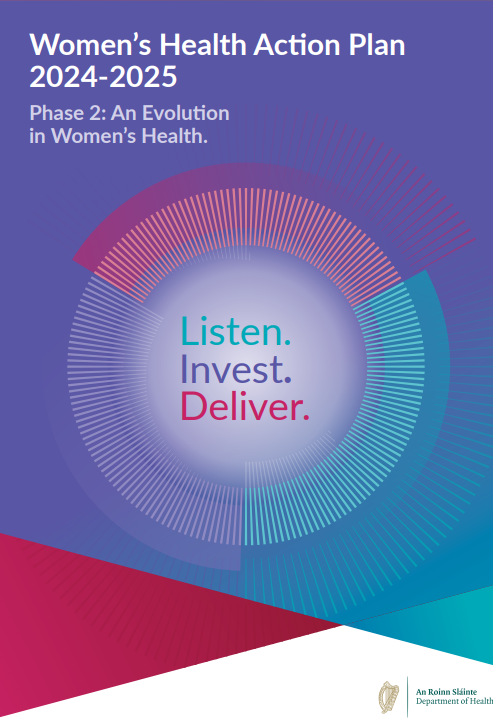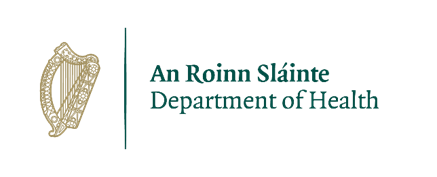
On the 18th April, Minister for Health Stephen Donnelly T.D.; Minister for Mental Health and Older People Mary Butler T.D.; Minister for Public Health, Wellbeing and the National Drugs Strategy Colm Burke T.D. and the Chief Nursing Officer Rachel Kenna launched the Women’s Health Action Plan 2024-2025 Phase 2: An Evolution in Women’s Health.
This Action Plan aims to build on the significant development of women’s health services over the last two years as well as the delivery of new services. It is supported by investment of more than €11 million, bringing total additional funding for women’s health to over €140 million since 2020. This funding will be used to expand and develop priority initiatives as identified by the Women’s Health Taskforce.
There are three pillars to the Action Plan:
Pillar 1 – Building on Progress: Focusing on the safeguarding and expansion of services developed during the first Action Plan. It includes the expansion of the Free Contraception Scheme to women aged 17-35, increasing capacity of Specialist Menopause Clinics, and the roll-out of additional “See-and-Treat” Gynaecology Clinics.
Pillar 2 – New spotlights for 2024-2025: This includes the development of the first public Assisted Human Reproduction Treatment Centre, initiatives targeted at women at midlife or older, to improve bone health and cardiovascular health, funding to expand the National Venous Thromboembolism Programme and supports for marginalised women.
Pillar 3 – Listening and Learning: Through the Women’s Health Taskforce, the Department of Health will continue to put women’s voices at the centre of policy creation. Initiatives include a new Radical Listening exercise planned for 2025, a new Patient Voice Forum to hear directly from women accessing existing services, as well as new research and outcomes analysis.
Minister Donnelly, said:
“In a very short space of time, our investment in women’s health has dramatically altered the landscape of women’s health services. Every week, I meet with people whose healthcare experience has been transformed by initiatives such as the Free Contraception Scheme, our network of services for fertility, menopause, endometriosis and our see-and-treat gynaecology clinics around the country.
“The success of these initiatives is evident in the increased demand in some areas so my focus now is on expanding capacity and improving delivery across the new HSE health regions to ensure that every woman can access timely, quality healthcare.
“We’re also continuing the evolution with a number of new initiatives, including the development of the first public Assisted Human Reproduction treatment centre, the development of a Cervical Cancer Elimination Action Plan and a focus on initiatives aimed at helping women in midlife and older to live better and longer.
“I’d like to take this opportunity to thank the Women’s Health Taskforce as the driving force behind the revolution and now this evolution in women’s healthcare, and I want to pay tribute to the clinicians and healthcare workers whose dedication has turned ambitious vision into positive reality for the women who use these services every day.”
Minister for Mental Health and Older People Mary Butler, said:
“We know that gender impacts on a person’s mental health needs and service requirements, and this is illustrated in initiatives delivered under the first Women’s Health Action Plan, including the setting up of 11 Specialist Eating Disorder Teams, 6 multidisciplinary teams in perinatal mental health services, and perinatal midwife posts across 13 sites.
“Furthermore, following on from the first Plan, work is currently underway to ensure that a Women’s Mental Health Charter is embedded in order to strengthen gender awareness, and ensure that women experience an inclusive, supportive and effective mental health service that meets their needs.
“I’m particularly pleased that new initiatives outlined in the Action Plan will target women at midlife or older. These initiatives are a recognition of the need for gender-specific healthcare that extends beyond menopause, helping women to live longer and healthier lives.”
Minister for Public Health, Wellbeing and the National Drugs Strategy Colm Burke, said:
“One of the key successes of the first Women’s Health Action Plan has been the removal of many financial barriers to healthcare. The Free Contraception Scheme has enabled women to take control of their reproductive health without having to consider cost. The Action Plan has also introduced period poverty measures through initiatives with 30 Local Authorities, the HSE and community partners and I’m delighted that the new plan will facilitate further expansion of these services.
“In my new role, I’m determined to prioritise policy initiatives that improve the health and wellbeing of the whole population, and particularly those in underserved populations. Actions outlined in the new Women’s Health Action Plan include drug treatment services for marginalised women and an emphasis on prevention which is so important in supporting our aim to improve overall health and wellbeing.”
The Chief Nursing Officer and Co-Chair of the Women’s Health Taskforce Rachel Kenna, said:
“The work of the Women’s Health Taskforce laid the foundations for what has been a transformative era for women’s health. By listening to women, the Taskforce identified priority areas for action which have been supported by extensive investment.
“As work continues embedding and expanding existing services, the focus now extends to areas such as post-menopause care, proactive health, screening, gynaecological care and better access to healthcare for marginalised groups.
“The Women’s Health Taskforce will continue to conduct listening exercises and to engage in research in order to contribute effectively to the development of robust policies that best serve women.”
The Women’s Health Action Plan 2024-2025 can be downloaded HERE
Highlights in the Women’s Health Action Plan Phase 2:
- Expansion of the Free Contraception Scheme from 31 years to 35 years.
- There will be a focus on women at midlife and older – “living well and living longer”.
- Capacity of the endometriosis services will be increased in the supraregional endometriosis centres and in the new endometriosis hubs.
- Expansion of screening services (Diabetic RetinaScreening and BreastCheck).
- Expansion of the Termination of Pregnancy services.
- A Patient Forum will be conducted in 2024 to hear from people who use women’s health services, with a new Radical listening exercise planned in 2025, to hear directly from women about their health experiences.
- Ireland’s Cervical Cancer Elimination Action Plan to be published in 2024.
- Evidence base for women’s health will increase through commissioned research and evidence reviews.
- Supports for mental health will be developed in line with “Pathways to Wellbeing: National Mental Health Promotion Framework.
- Continued implementation of period poverty measures.
Fertility services: Six Regional Fertility Hubs are now operational. (Coombe, National Maternity Hospital, Rotunda, Galway University Hospital, Cork University Maternity Hospital and Nenagh).
Patients are referred to these Hubs by their GP. A Regional Fertility Hub will assess patients with ultrasounds, blood work and semen analysis with a view to establishing a baseline clinical assessment for both partners. Thereafter, and based on these results, a plan of care is determined by the Reproductive Medical Specialist Consultant in tandem with patients. The Regional Fertility Hub can offer both medical and surgical management of care to facilitate conception. Many patients will have their fertility issues appropriately addressed at secondary care level within the Fertility Hub services. For those patients for whom AHR (assisted human reproduction) treatment is clinically indicated and who meet the national eligibility criteria as set by the Department of Health, a referral can be made by the relevant regional fertility team to a HSE-approved private AHR provider of the couple’s choosing.
The level of referrals continues to fluctuate month-by-month across the six Regional Fertility Hubs, with it being determined that the system has not yet reached a steady state in terms of demand. As such, over the last number of months the number of referrals received per month across the six Hubs has tended to be in the region of circa 400 to 500 per month. Approximately 500 couples had been referred by a Reproductive Medical Specialist for AHR services by early April.
The new Action Plan makes a commitment to establish the first publicly-provided National AHR Centre.
Endometriosis services: Five regional endometriosis hubs are operational and are offering an initial level of service which will expand as full teams are recruited (Rotunda, Coombe, National Maternity Hospital, Limerick and Galway).
Patients with complex needs are referred to one of two Specialist Endometriosis Centres for complex care in Tallaght and Cork.

